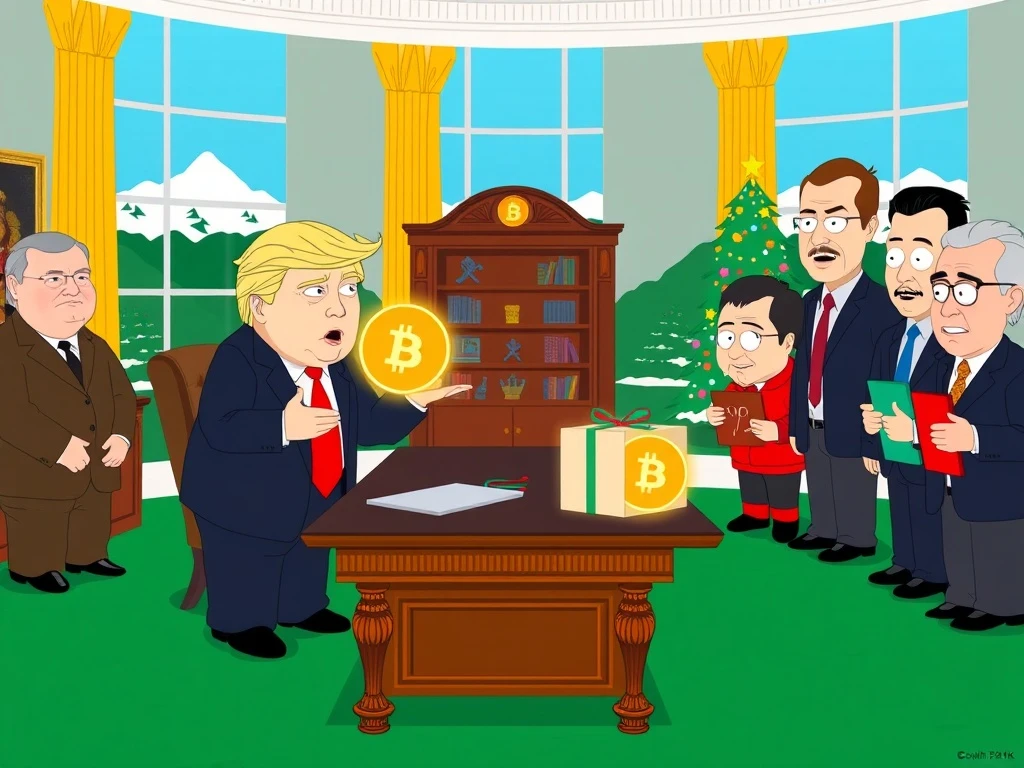Unveiled: South Park’s Bold Critique of Donald Trump’s Crypto Ties

The latest South Park episode recently sparked widespread discussion. It vividly portrays former US President Donald Trump accepting Bitcoin as gifts. This satirical take on Donald Trump crypto ties quickly captured audience attention. The long-running comedy series often reflects current events. Its newest installment, titled ‘Sickofancy,’ delves into the intersection of politics and technology. Viewers saw parodied tech executives eager to please Trump. They lined up to offer him praise and valuable gifts.
South Park’s Bold Take on Donald Trump Crypto
The episode ‘Sickofancy’ aired on Wednesday, offering sharp commentary. It showed scenes where caricatured tech leaders approached a fictional President Trump. Specifically, figures resembling Microsoft CEO Sundar Pichai and venture capitalist David Sacks appeared. Both were depicted gifting Bitcoin (BTC) to Trump. This visual satire highlights growing concerns. Many critics question the implications of a president’s pro-crypto stance. Especially when the president and his family have personal crypto ventures.
Indeed, Trump’s family has deepened their involvement in the crypto space. They operate a trading platform, a stablecoin, and various tokens. Furthermore, they own a crypto mining business. Therefore, the show’s portrayal directly addresses these real-world connections. It uses humor to draw attention to potential conflicts of interest. The episode’s focus on Donald Trump crypto dealings provides a timely social commentary. It reflects ongoing public debate.
Unpacking Trump’s Deepening Crypto Ties
The episode does not shy away from direct allusions. It references the real-world concerns surrounding Trump’s crypto involvement. Critics have consistently voiced worries. They point to the former president’s increasingly pro-crypto policy positions. These positions, consequently, coincide with his family’s expanding digital asset portfolio. This includes:
- A dedicated crypto trading platform.
- Their own stablecoin project.
- Various associated tokens.
- A significant crypto mining operation.
Such deep ties raise questions about impartiality. Many observers wonder about the influence of personal financial interests on policy decisions. South Park’s satire thus serves as a mirror. It reflects these complex and often controversial issues. The show effectively uses comedy to explore serious ethical dilemmas. It prompts viewers to consider the broader implications of these connections.

Bitcoin Adoption in South Park’s Satirical World
The ‘Sickofancy’ episode also satirizes the broader societal reliance on AI. A character transforms his cannabis farm into an AI startup. This happens after an ICE raid impacts his workforce. He then seeks advice from a sycophantic ChatGPT. The AI suggests flattering Trump to re-classify cannabis. This action would ultimately save his business. The show’s narrative cleverly weaves in themes of desperation and manipulation. It highlights how technology can be misused for personal gain.
Moreover, the episode features other prominent tech figures. Apple CEO Tim Cook, Nvidia CEO Jensen Huang, and Meta’s Mark Zuckerberg are shown. They line up at the Oval Office. They flatter Trump and offer him gifts. This imagery underscores the theme of powerful individuals seeking political favor. The presence of Bitcoin as a gift specifically highlights its perceived value. It suggests its growing acceptance among influential figures. This is a subtle nod to increasing Bitcoin adoption. It shows its emerging role as a valuable asset, even in a satirical context.
South Park’s History of Crypto Commentary
South Park’s 27th season debuted in late July. Its initial episodes heavily criticized Trump and his administration. This drew sharp responses from the White House. The season’s debut episode focused on Paramount’s $16 million settlement with Trump. This settlement stemmed from a 60 Minutes interview with Kamala Harris. Paramount recently paid $1.5 billion for South Park’s streaming rights. The debut episode included an AI-generated deepfake of Trump. He stripped naked in a desert. A White House spokesperson consequently called South Park a ‘fourth-rate show.’ They added it ‘hasn’t been relevant for over 20 years.’ This reaction further amplified the show’s impact. It confirmed the potency of its political satire crypto commentary.
Indeed, South Park has a long history of addressing crypto topics. The series has been on air for nearly 28 years. It frequently incorporates comedic parodies of digital assets. For instance, an episode in 2022 ridiculed Matt Damon’s promotion for Crypto.com. An earlier episode in 2021 joked about a character’s power. This character could convince people that non-fungible tokens (NFTs) were a ‘viable investment.’ Another 2021 episode depicted Bitcoin as a mainstream payment method in the future. A character stated, ‘We’ve all decided centralized banking is rigged, so we trust more in fly-by-night Ponzi schemes.’ These examples demonstrate South Park’s consistent engagement with the evolving crypto landscape.
The Intersection of Political Satire and Digital Assets
The latest South Park episode also parodies Trump’s recent deployment of the National Guard. It depicts Washington, D.C., as overrun with military personnel. Major landmarks are shown under military control. The show continues its running gag of depicting Trump with a small penis. It also shows him sleeping with Satan. Vice President JD Vance is portrayed as a chubby-faced toddler. These elements collectively form a potent blend of humor and critique. They ensure the show remains relevant and provocative.
Ultimately, the show’s decision to integrate Trump’s crypto ties into its narrative is significant. It reflects the increasing mainstream awareness of digital currencies. It also highlights the growing political implications of this emerging asset class. South Park continues to use its unique brand of humor. It offers a critical lens on current events. This latest episode, therefore, stands as a notable piece of cultural commentary. It connects the worlds of politics, technology, and popular culture through sharp satire.









